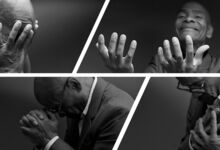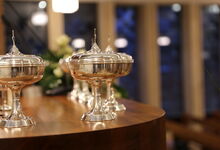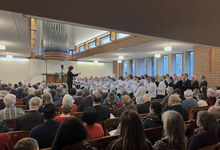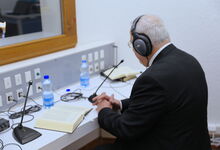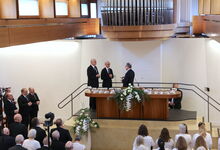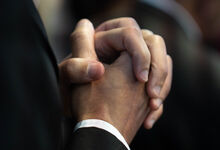Laying down our own crown before God
God is eternal, our own earthly existence is limited. God is omnipotent, whereas we often feel powerless. God’s thoughts are much higher than the human mind can comprehend. How can we then worship God appropriately? Following are some inspiring thoughts underlining our annual motto “Prayer works!”

It is understandably not so easy to give the great God His due in the way of praise and honour. “Draw near to God and He will draw near to you.” This is the recommendation in James on how we should purify and sanctify ourselves and humble ourselves before God. Depending on our own situation, coming under God’s gaze can be associated with worry.
First, we must create an awareness of who God really is. Chief Apostle Jean-Luc Schneider summarised this as follows in his sermon during the New Year’s service: “He never makes mistakes. Everything He does is perfect. Nothing needs to be fixed or improved on.”
Knowing this, how much more must we then humble ourselves when we pray? Are we nobodies before God? Are we unworthy to call Him by His name?
The throne room of heaven
The fourth chapter of Revelation provides an interesting image of worship.
In a vision, the seer John is shown the throne room of heaven. God is sitting on a throne, around which were another twenty-four thrones. Twenty-four elders are sitting on these thrones, with crowns of gold on their heads. These figures can be understood to symbolise all those who took part in the rapture when Jesus returned. More important, however, is their behaviour.
They fall down before Him who sits on the throne and worship Him who lives forever and ever, and lay their crowns before the throne, saying, “You are worthy, O Lord, to receive glory and honour and power; for You created all things, and by Your will they exist and were created.”
Crowned by God
Man, human beings, are described as the crown of creation. God not only entrusted the creation to us, but because He has created us in His image we can freely shape it.
The Psalms say, “You have crowned him [man] with glory and honour. You have made him to have dominion over the works of Your hands; You have put all things under his feet.” This crowning is not only a reference to this earthly creation, but also to salvation: “Bless the Lord, O my soul, who redeems your life from destruction, who crowns you with lovingkindness and tender mercies.”
Jesus emphasises the value of this crown in one of the seven letters to the churches. He warns the church in Philadelphia not to allow this crown to be taken from them. So we are not nobodies before God—we neither lack the worth nor are we undeserving. In fact, God made man only a little lower than Himself.
The freedom to kneel before God
Worshipping God and acknowledging Him as the Almighty therefore means laying down our own crown before His throne and falling down before Him ourselves. For He is the one who crowns with honour and glory.
We can decide in favour of or against God, for or against our own salvation. Kneeling before God is not a sign of compulsion, but of complete freedom. Paul describes this in Galatians: “Stand fast therefore in the liberty by which Christ has made us free.”
Those who lay down their own crown before God in prayer consciously put aside egoism and self-indulgence. Many people have achieved and accomplished a lot by themselves, as they would see it. Many thoughts and requests revolve around our own little universe. Putting aside our own will, our own ideas, or definition of happiness and recognising God’s will as perfect is part of worshipping God. This is how we can place ourselves at the service of God already in our prayers.
Photo: olga pink -stock.adobe.com



